Hematologist Resume Examples

Jul 18, 2024
|
12 min read
Craft your hematologist resume: cure your career woes one cell at a time! Learn how to highlight your skills and expertise to stand out in the medical field. Get tips on making your resume bloodwork-compatible!
Rated by 348 people
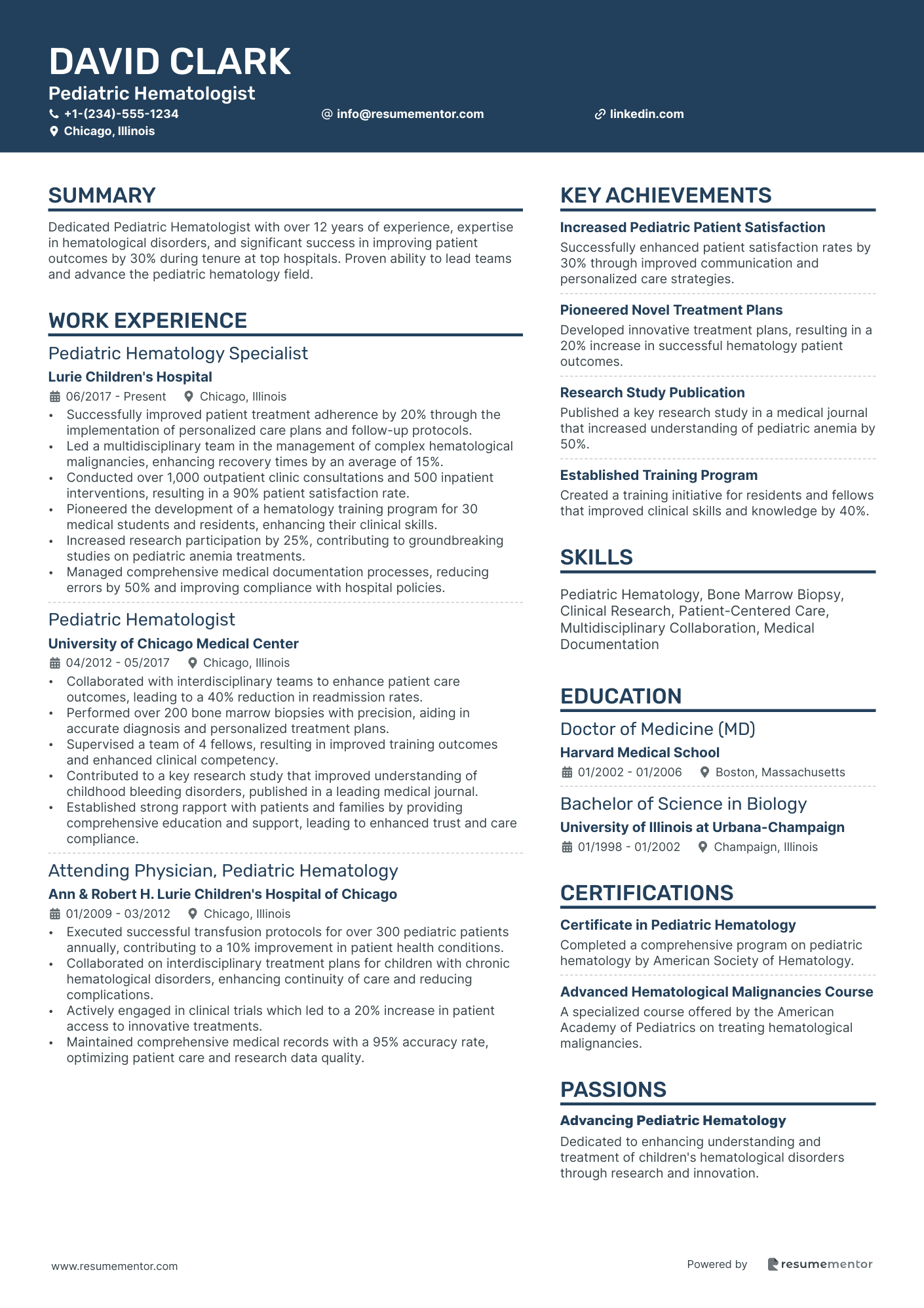
Pediatric Hematologist
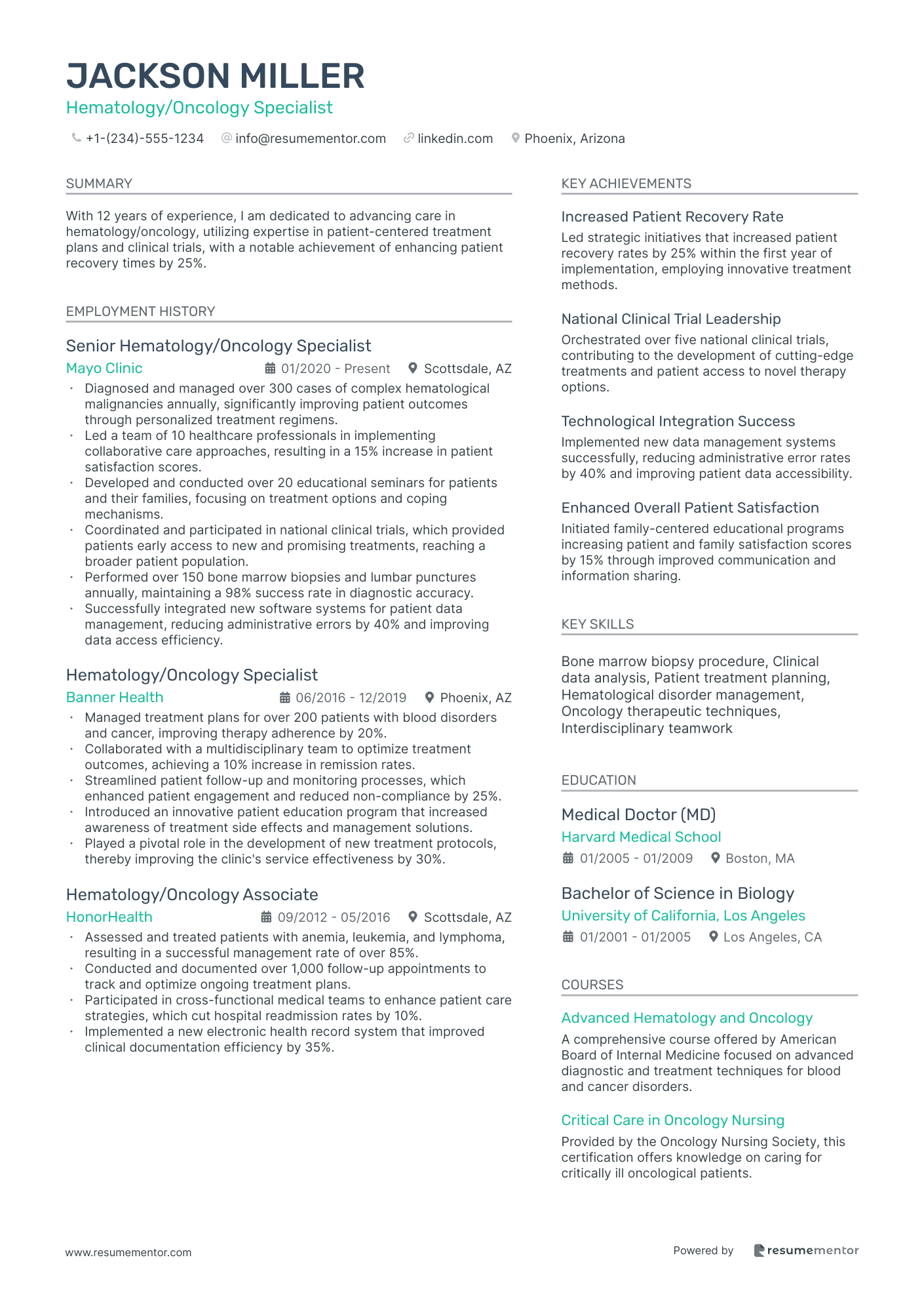
Hematology/Oncology Specialist
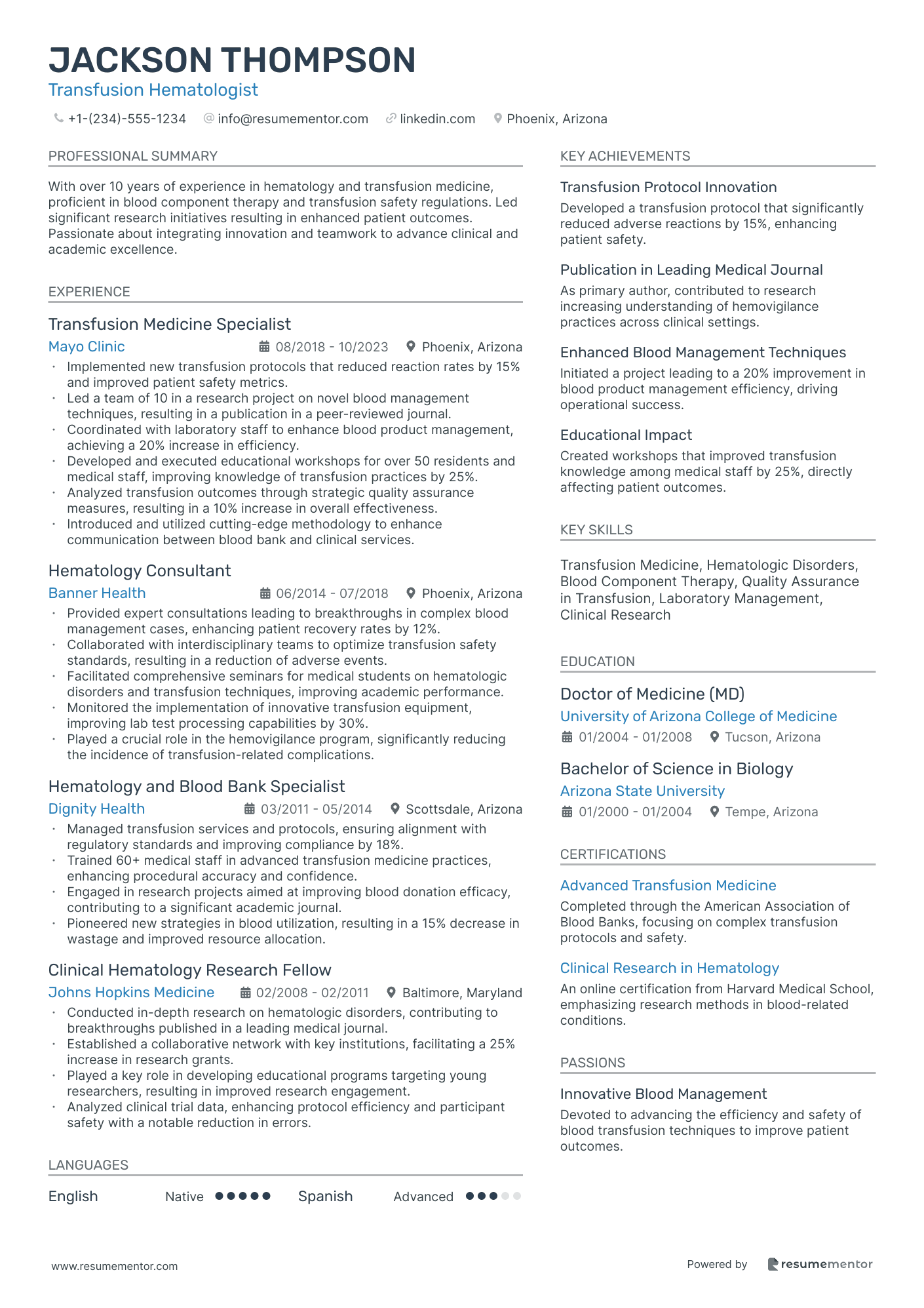
Transfusion Hematologist
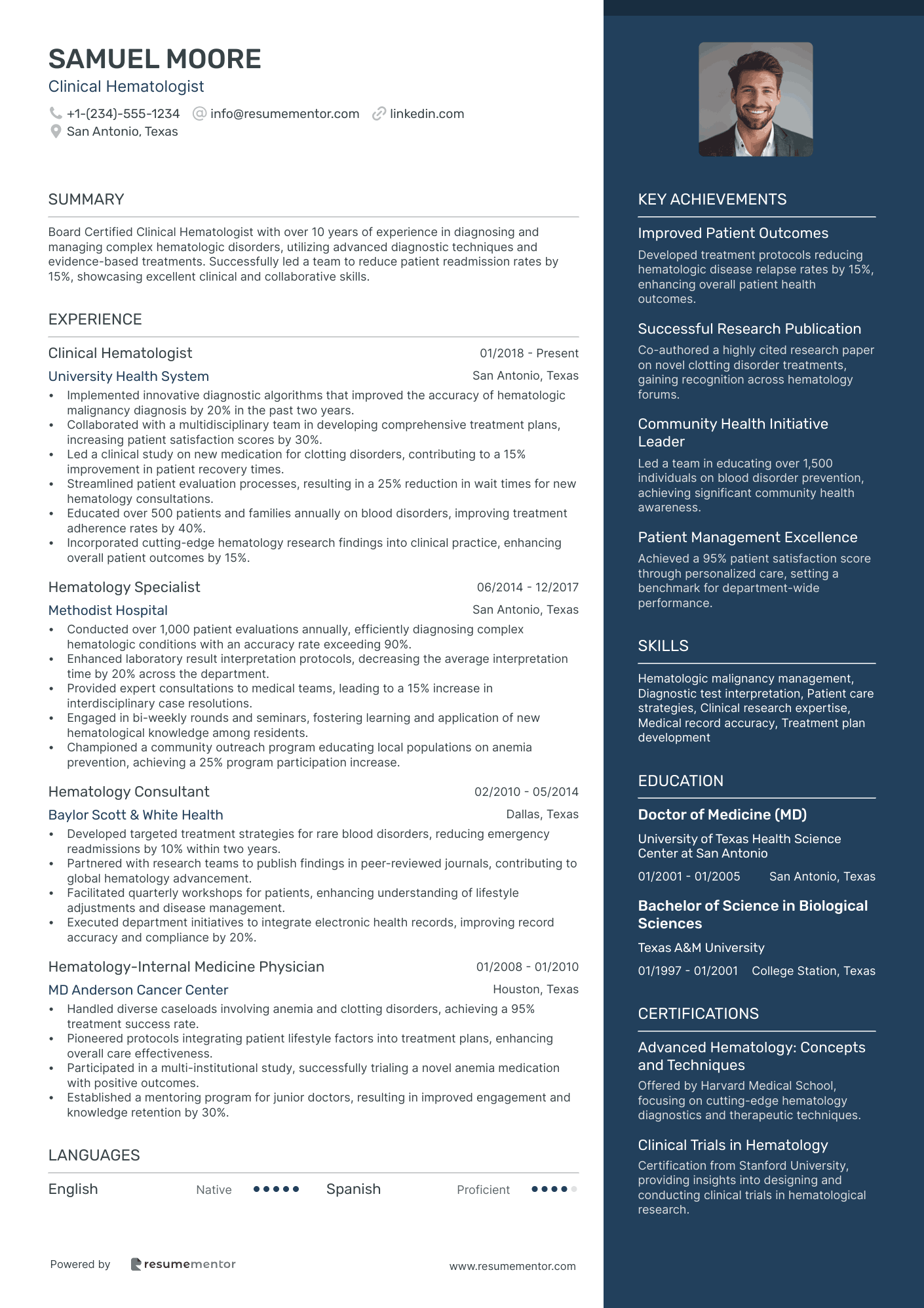
Clinical Hematologist
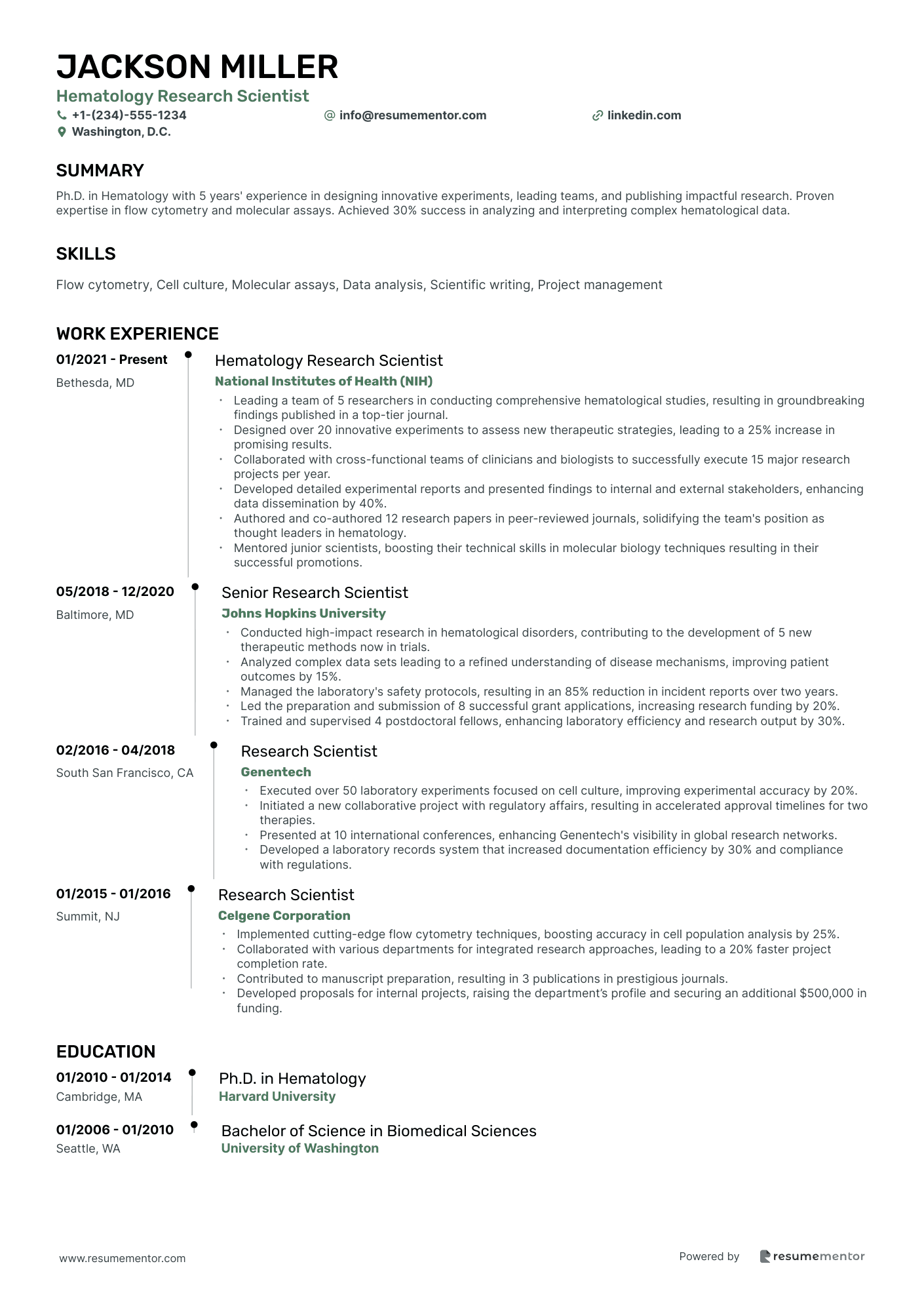
Hematology Research Scientist
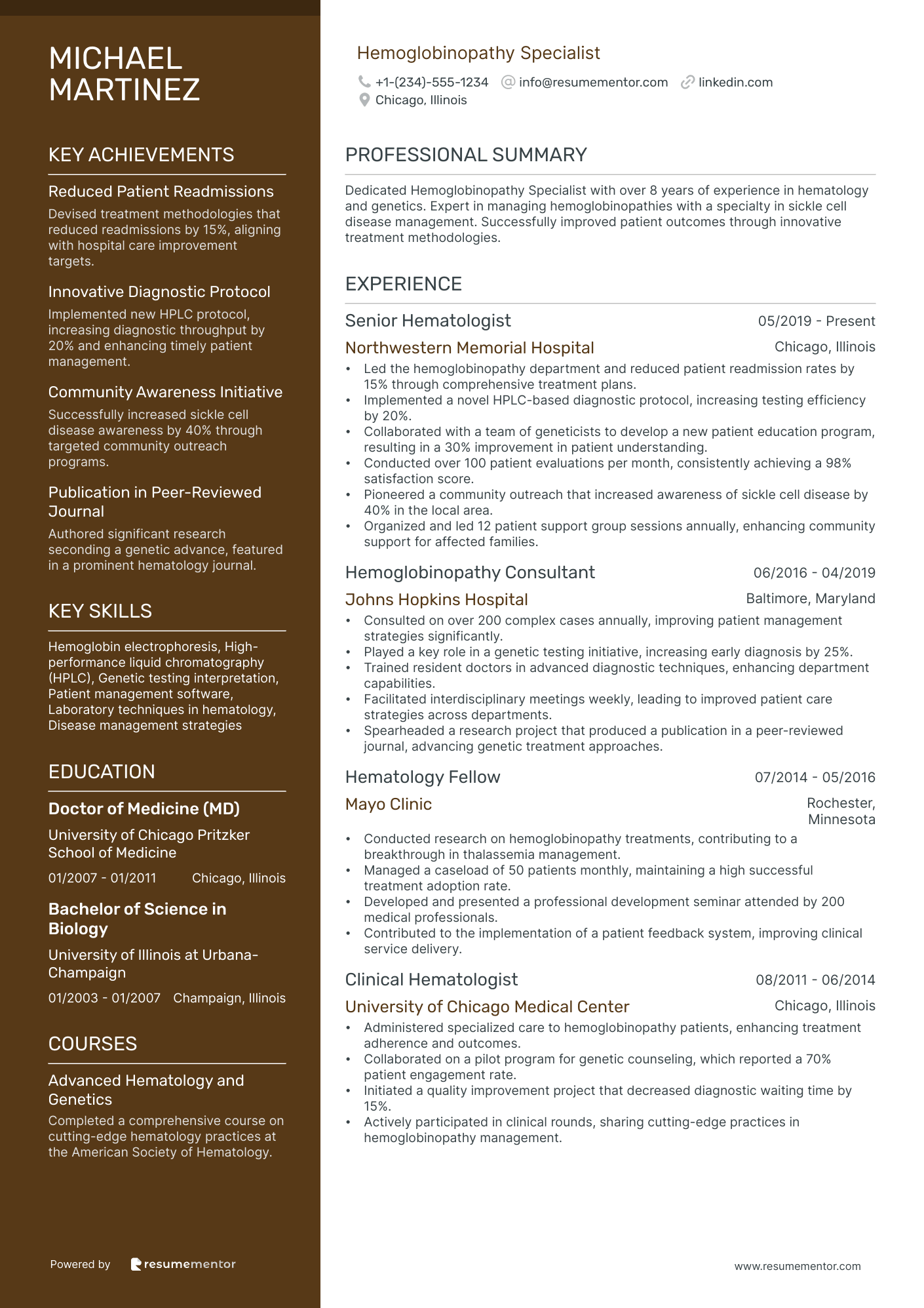
Hemoglobinopathy Specialist
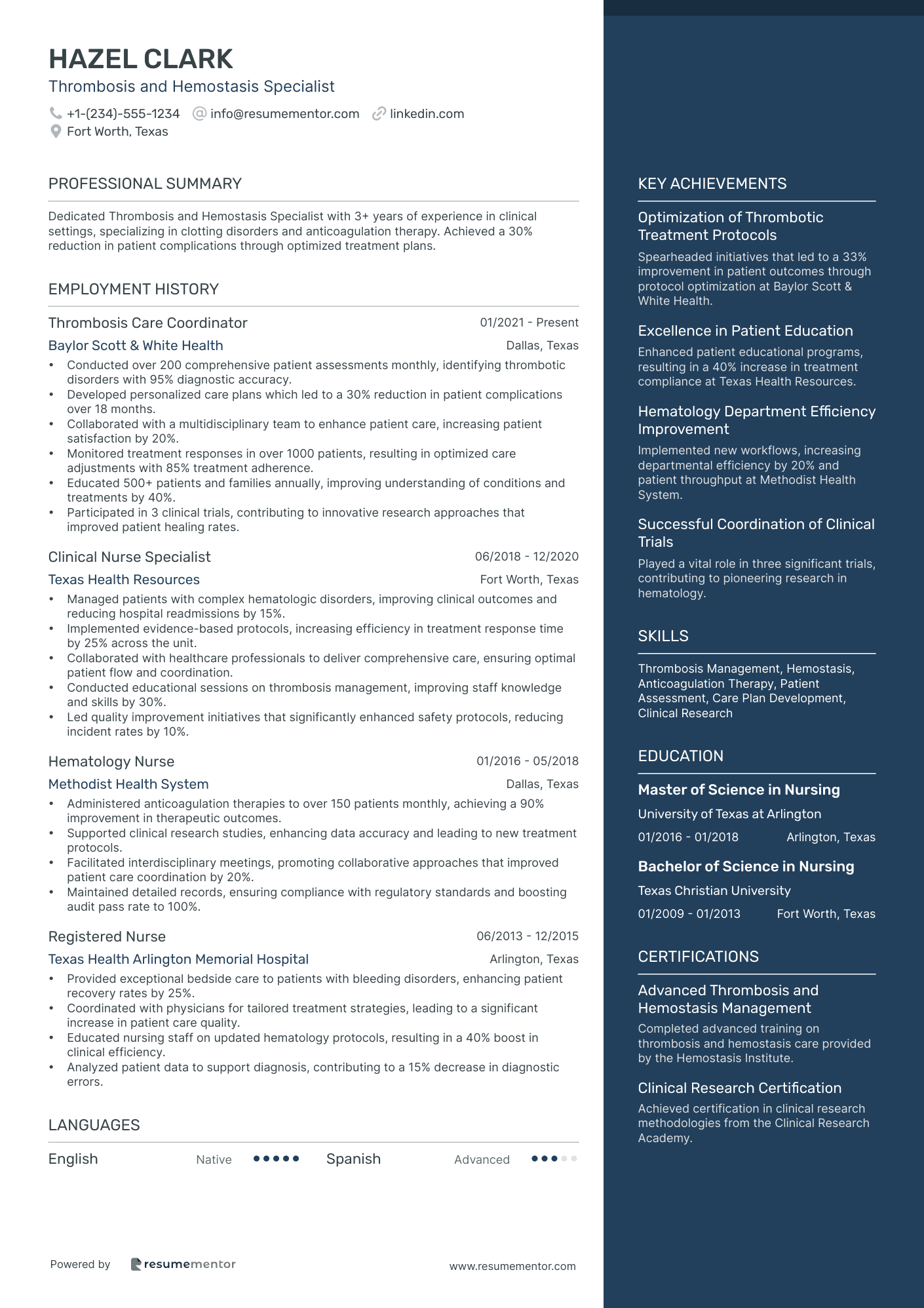
Thrombosis and Hemostasis Specialist
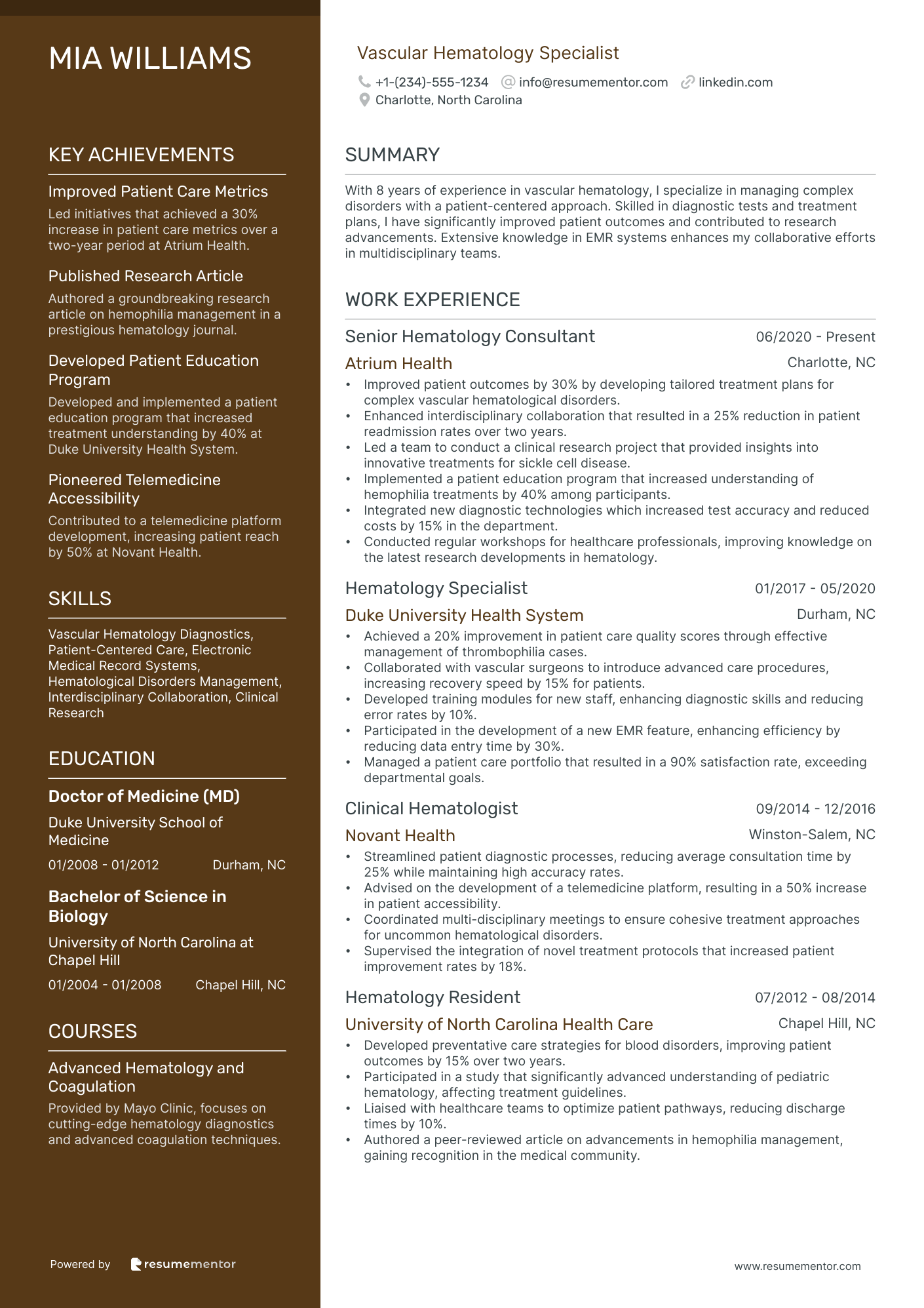
Vascular Hematology Specialist
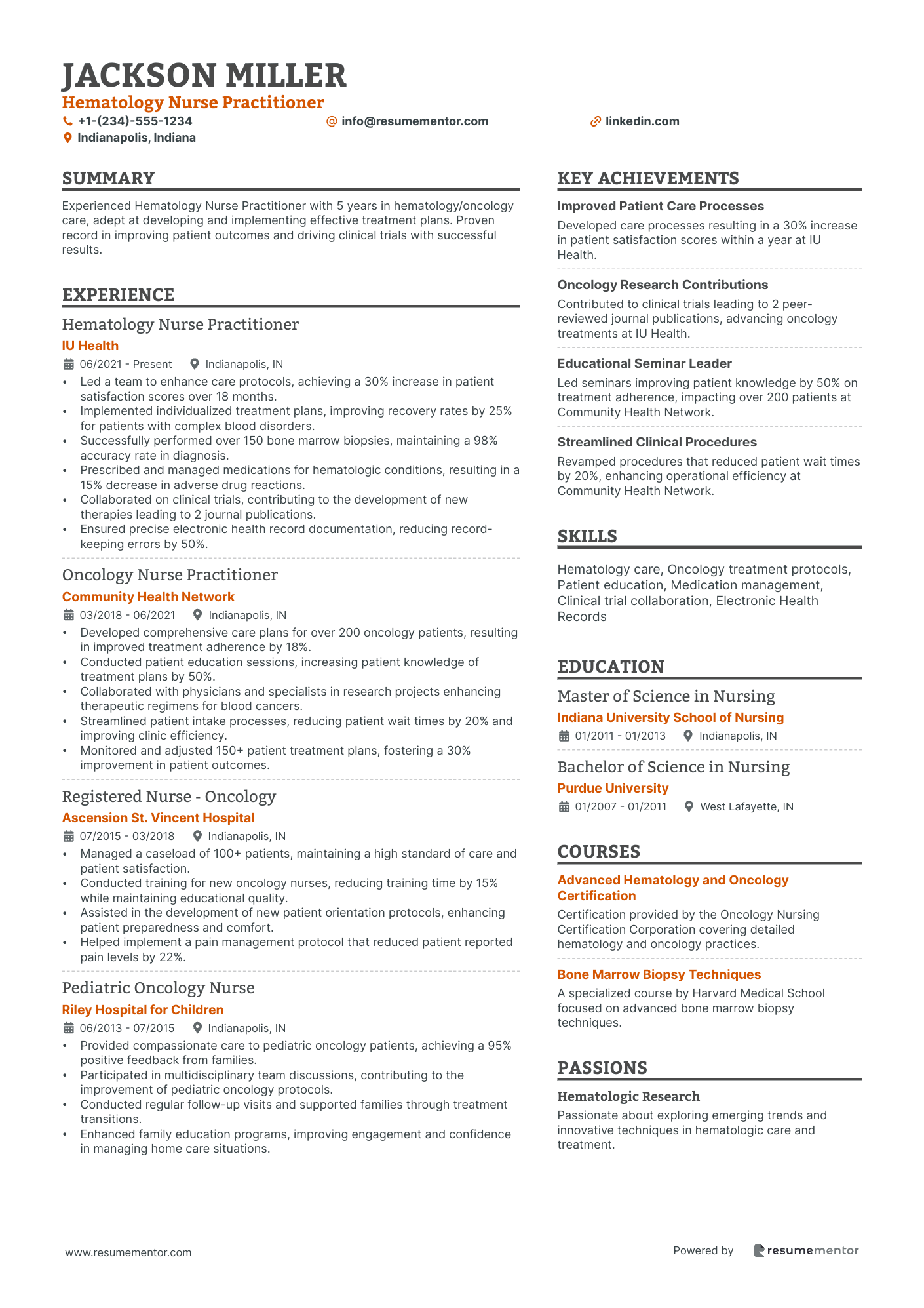
Hematology Nurse Practitioner

Pediatric Hematologist resume sample
- •Successfully improved patient treatment adherence by 20% through the implementation of personalized care plans and follow-up protocols.
- •Led a multidisciplinary team in the management of complex hematological malignancies, enhancing recovery times by an average of 15%.
- •Conducted over 1,000 outpatient clinic consultations and 500 inpatient interventions, resulting in a 90% patient satisfaction rate.
- •Pioneered the development of a hematology training program for 30 medical students and residents, enhancing their clinical skills.
- •Increased research participation by 25%, contributing to groundbreaking studies on pediatric anemia treatments.
- •Managed comprehensive medical documentation processes, reducing errors by 50% and improving compliance with hospital policies.
- •Collaborated with interdisciplinary teams to enhance patient care outcomes, leading to a 40% reduction in readmission rates.
- •Performed over 200 bone marrow biopsies with precision, aiding in accurate diagnosis and personalized treatment plans.
- •Supervised a team of 4 fellows, resulting in improved training outcomes and enhanced clinical competency.
- •Contributed to a key research study that improved understanding of childhood bleeding disorders, published in a leading medical journal.
- •Established strong rapport with patients and families by providing comprehensive education and support, leading to enhanced trust and care compliance.
- •Executed successful transfusion protocols for over 300 pediatric patients annually, contributing to a 10% improvement in patient health conditions.
- •Collaborated on interdisciplinary treatment plans for children with chronic hematological disorders, enhancing continuity of care and reducing complications.
- •Actively engaged in clinical trials which led to a 20% increase in patient access to innovative treatments.
- •Maintained comprehensive medical records with a 95% accuracy rate, optimizing patient care and research data quality.
- •Contributed to a study on pediatric leukemia, resulting in a 15% increase in targeted therapy options.
- •Participated in over 100 complex diagnoses of hematological disorders, ensuring timely and effective patient management.
- •Facilitated seminars for medical students, increasing enrollment in the pediatric hematology field by 30%.
- •Enhanced team efforts in treatment planning, leading to a 25% improvement in patient survival rates.
Hematology/Oncology Specialist resume sample
- •Diagnosed and managed over 300 cases of complex hematological malignancies annually, significantly improving patient outcomes through personalized treatment regimens.
- •Led a team of 10 healthcare professionals in implementing collaborative care approaches, resulting in a 15% increase in patient satisfaction scores.
- •Developed and conducted over 20 educational seminars for patients and their families, focusing on treatment options and coping mechanisms.
- •Coordinated and participated in national clinical trials, which provided patients early access to new and promising treatments, reaching a broader patient population.
- •Performed over 150 bone marrow biopsies and lumbar punctures annually, maintaining a 98% success rate in diagnostic accuracy.
- •Successfully integrated new software systems for patient data management, reducing administrative errors by 40% and improving data access efficiency.
- •Managed treatment plans for over 200 patients with blood disorders and cancer, improving therapy adherence by 20%.
- •Collaborated with a multidisciplinary team to optimize treatment outcomes, achieving a 10% increase in remission rates.
- •Streamlined patient follow-up and monitoring processes, which enhanced patient engagement and reduced non-compliance by 25%.
- •Introduced an innovative patient education program that increased awareness of treatment side effects and management solutions.
- •Played a pivotal role in the development of new treatment protocols, thereby improving the clinic's service effectiveness by 30%.
- •Assessed and treated patients with anemia, leukemia, and lymphoma, resulting in a successful management rate of over 85%.
- •Conducted and documented over 1,000 follow-up appointments to track and optimize ongoing treatment plans.
- •Participated in cross-functional medical teams to enhance patient care strategies, which cut hospital readmission rates by 10%.
- •Implemented a new electronic health record system that improved clinical documentation efficiency by 35%.
- •Completed in-depth training in diagnosing and treating rare and complex cases, focusing on multi-faceted treatment approaches.
- •Researched and published articles on advanced oncology treatments, contributing to the enhancement of therapeutic methods.
- •Effectively communicated complex medical information to a diverse patient base, ensuring understanding of treatment pathways.
- •Assisted in the collaborative management of clinical trials, providing additional treatment options to high-risk patients.
Transfusion Hematologist resume sample
- •Implemented new transfusion protocols that reduced reaction rates by 15% and improved patient safety metrics.
- •Led a team of 10 in a research project on novel blood management techniques, resulting in a publication in a peer-reviewed journal.
- •Coordinated with laboratory staff to enhance blood product management, achieving a 20% increase in efficiency.
- •Developed and executed educational workshops for over 50 residents and medical staff, improving knowledge of transfusion practices by 25%.
- •Analyzed transfusion outcomes through strategic quality assurance measures, resulting in a 10% increase in overall effectiveness.
- •Introduced and utilized cutting-edge methodology to enhance communication between blood bank and clinical services.
- •Provided expert consultations leading to breakthroughs in complex blood management cases, enhancing patient recovery rates by 12%.
- •Collaborated with interdisciplinary teams to optimize transfusion safety standards, resulting in a reduction of adverse events.
- •Facilitated comprehensive seminars for medical students on hematologic disorders and transfusion techniques, improving academic performance.
- •Monitored the implementation of innovative transfusion equipment, improving lab test processing capabilities by 30%.
- •Played a crucial role in the hemovigilance program, significantly reducing the incidence of transfusion-related complications.
- •Managed transfusion services and protocols, ensuring alignment with regulatory standards and improving compliance by 18%.
- •Trained 60+ medical staff in advanced transfusion medicine practices, enhancing procedural accuracy and confidence.
- •Engaged in research projects aimed at improving blood donation efficacy, contributing to a significant academic journal.
- •Pioneered new strategies in blood utilization, resulting in a 15% decrease in wastage and improved resource allocation.
- •Conducted in-depth research on hematologic disorders, contributing to breakthroughs published in a leading medical journal.
- •Established a collaborative network with key institutions, facilitating a 25% increase in research grants.
- •Played a key role in developing educational programs targeting young researchers, resulting in improved research engagement.
- •Analyzed clinical trial data, enhancing protocol efficiency and participant safety with a notable reduction in errors.
Clinical Hematologist resume sample
- •Implemented innovative diagnostic algorithms that improved the accuracy of hematologic malignancy diagnosis by 20% in the past two years.
- •Collaborated with a multidisciplinary team in developing comprehensive treatment plans, increasing patient satisfaction scores by 30%.
- •Led a clinical study on new medication for clotting disorders, contributing to a 15% improvement in patient recovery times.
- •Streamlined patient evaluation processes, resulting in a 25% reduction in wait times for new hematology consultations.
- •Educated over 500 patients and families annually on blood disorders, improving treatment adherence rates by 40%.
- •Incorporated cutting-edge hematology research findings into clinical practice, enhancing overall patient outcomes by 15%.
- •Conducted over 1,000 patient evaluations annually, efficiently diagnosing complex hematologic conditions with an accuracy rate exceeding 90%.
- •Enhanced laboratory result interpretation protocols, decreasing the average interpretation time by 20% across the department.
- •Provided expert consultations to medical teams, leading to a 15% increase in interdisciplinary case resolutions.
- •Engaged in bi-weekly rounds and seminars, fostering learning and application of new hematological knowledge among residents.
- •Championed a community outreach program educating local populations on anemia prevention, achieving a 25% program participation increase.
- •Developed targeted treatment strategies for rare blood disorders, reducing emergency readmissions by 10% within two years.
- •Partnered with research teams to publish findings in peer-reviewed journals, contributing to global hematology advancement.
- •Facilitated quarterly workshops for patients, enhancing understanding of lifestyle adjustments and disease management.
- •Executed department initiatives to integrate electronic health records, improving record accuracy and compliance by 20%.
- •Handled diverse caseloads involving anemia and clotting disorders, achieving a 95% treatment success rate.
- •Pioneered protocols integrating patient lifestyle factors into treatment plans, enhancing overall care effectiveness.
- •Participated in a multi-institutional study, successfully trialing a novel anemia medication with positive outcomes.
- •Established a mentoring program for junior doctors, resulting in improved engagement and knowledge retention by 30%.
Hematology Research Scientist resume sample
- •Leading a team of 5 researchers in conducting comprehensive hematological studies, resulting in groundbreaking findings published in a top-tier journal.
- •Designed over 20 innovative experiments to assess new therapeutic strategies, leading to a 25% increase in promising results.
- •Collaborated with cross-functional teams of clinicians and biologists to successfully execute 15 major research projects per year.
- •Developed detailed experimental reports and presented findings to internal and external stakeholders, enhancing data dissemination by 40%.
- •Authored and co-authored 12 research papers in peer-reviewed journals, solidifying the team's position as thought leaders in hematology.
- •Mentored junior scientists, boosting their technical skills in molecular biology techniques resulting in their successful promotions.
- •Conducted high-impact research in hematological disorders, contributing to the development of 5 new therapeutic methods now in trials.
- •Analyzed complex data sets leading to a refined understanding of disease mechanisms, improving patient outcomes by 15%.
- •Managed the laboratory's safety protocols, resulting in an 85% reduction in incident reports over two years.
- •Led the preparation and submission of 8 successful grant applications, increasing research funding by 20%.
- •Trained and supervised 4 postdoctoral fellows, enhancing laboratory efficiency and research output by 30%.
- •Executed over 50 laboratory experiments focused on cell culture, improving experimental accuracy by 20%.
- •Initiated a new collaborative project with regulatory affairs, resulting in accelerated approval timelines for two therapies.
- •Presented at 10 international conferences, enhancing Genentech's visibility in global research networks.
- •Developed a laboratory records system that increased documentation efficiency by 30% and compliance with regulations.
- •Implemented cutting-edge flow cytometry techniques, boosting accuracy in cell population analysis by 25%.
- •Collaborated with various departments for integrated research approaches, leading to a 20% faster project completion rate.
- •Contributed to manuscript preparation, resulting in 3 publications in prestigious journals.
- •Developed proposals for internal projects, raising the department’s profile and securing an additional $500,000 in funding.
Hemoglobinopathy Specialist resume sample
- •Led the hemoglobinopathy department and reduced patient readmission rates by 15% through comprehensive treatment plans.
- •Implemented a novel HPLC-based diagnostic protocol, increasing testing efficiency by 20%.
- •Collaborated with a team of geneticists to develop a new patient education program, resulting in a 30% improvement in patient understanding.
- •Conducted over 100 patient evaluations per month, consistently achieving a 98% satisfaction score.
- •Pioneered a community outreach that increased awareness of sickle cell disease by 40% in the local area.
- •Organized and led 12 patient support group sessions annually, enhancing community support for affected families.
- •Consulted on over 200 complex cases annually, improving patient management strategies significantly.
- •Played a key role in a genetic testing initiative, increasing early diagnosis by 25%.
- •Trained resident doctors in advanced diagnostic techniques, enhancing department capabilities.
- •Facilitated interdisciplinary meetings weekly, leading to improved patient care strategies across departments.
- •Spearheaded a research project that produced a publication in a peer-reviewed journal, advancing genetic treatment approaches.
- •Conducted research on hemoglobinopathy treatments, contributing to a breakthrough in thalassemia management.
- •Managed a caseload of 50 patients monthly, maintaining a high successful treatment adoption rate.
- •Developed and presented a professional development seminar attended by 200 medical professionals.
- •Contributed to the implementation of a patient feedback system, improving clinical service delivery.
- •Administered specialized care to hemoglobinopathy patients, enhancing treatment adherence and outcomes.
- •Collaborated on a pilot program for genetic counseling, which reported a 70% patient engagement rate.
- •Initiated a quality improvement project that decreased diagnostic waiting time by 15%.
- •Actively participated in clinical rounds, sharing cutting-edge practices in hemoglobinopathy management.
Thrombosis and Hemostasis Specialist resume sample
- •Conducted over 200 comprehensive patient assessments monthly, identifying thrombotic disorders with 95% diagnostic accuracy.
- •Developed personalized care plans which led to a 30% reduction in patient complications over 18 months.
- •Collaborated with a multidisciplinary team to enhance patient care, increasing patient satisfaction by 20%.
- •Monitored treatment responses in over 1000 patients, resulting in optimized care adjustments with 85% treatment adherence.
- •Educated 500+ patients and families annually, improving understanding of conditions and treatments by 40%.
- •Participated in 3 clinical trials, contributing to innovative research approaches that improved patient healing rates.
- •Managed patients with complex hematologic disorders, improving clinical outcomes and reducing hospital readmissions by 15%.
- •Implemented evidence-based protocols, increasing efficiency in treatment response time by 25% across the unit.
- •Collaborated with healthcare professionals to deliver comprehensive care, ensuring optimal patient flow and coordination.
- •Conducted educational sessions on thrombosis management, improving staff knowledge and skills by 30%.
- •Led quality improvement initiatives that significantly enhanced safety protocols, reducing incident rates by 10%.
- •Administered anticoagulation therapies to over 150 patients monthly, achieving a 90% improvement in therapeutic outcomes.
- •Supported clinical research studies, enhancing data accuracy and leading to new treatment protocols.
- •Facilitated interdisciplinary meetings, promoting collaborative approaches that improved patient care coordination by 20%.
- •Maintained detailed records, ensuring compliance with regulatory standards and boosting audit pass rate to 100%.
- •Provided exceptional bedside care to patients with bleeding disorders, enhancing patient recovery rates by 25%.
- •Coordinated with physicians for tailored treatment strategies, leading to a significant increase in patient care quality.
- •Educated nursing staff on updated hematology protocols, resulting in a 40% boost in clinical efficiency.
- •Analyzed patient data to support diagnosis, contributing to a 15% decrease in diagnostic errors.
Vascular Hematology Specialist resume sample
- •Improved patient outcomes by 30% by developing tailored treatment plans for complex vascular hematological disorders.
- •Enhanced interdisciplinary collaboration that resulted in a 25% reduction in patient readmission rates over two years.
- •Led a team to conduct a clinical research project that provided insights into innovative treatments for sickle cell disease.
- •Implemented a patient education program that increased understanding of hemophilia treatments by 40% among participants.
- •Integrated new diagnostic technologies which increased test accuracy and reduced costs by 15% in the department.
- •Conducted regular workshops for healthcare professionals, improving knowledge on the latest research developments in hematology.
- •Achieved a 20% improvement in patient care quality scores through effective management of thrombophilia cases.
- •Collaborated with vascular surgeons to introduce advanced care procedures, increasing recovery speed by 15% for patients.
- •Developed training modules for new staff, enhancing diagnostic skills and reducing error rates by 10%.
- •Participated in the development of a new EMR feature, enhancing efficiency by reducing data entry time by 30%.
- •Managed a patient care portfolio that resulted in a 90% satisfaction rate, exceeding departmental goals.
- •Streamlined patient diagnostic processes, reducing average consultation time by 25% while maintaining high accuracy rates.
- •Advised on the development of a telemedicine platform, resulting in a 50% increase in patient accessibility.
- •Coordinated multi-disciplinary meetings to ensure cohesive treatment approaches for uncommon hematological disorders.
- •Supervised the integration of novel treatment protocols that increased patient improvement rates by 18%.
- •Developed preventative care strategies for blood disorders, improving patient outcomes by 15% over two years.
- •Participated in a study that significantly advanced understanding of pediatric hematology, affecting treatment guidelines.
- •Liaised with healthcare teams to optimize patient pathways, reducing discharge times by 10%.
- •Authored a peer-reviewed article on advancements in hemophilia management, gaining recognition in the medical community.
Hematology Nurse Practitioner resume sample
- •Led a team to enhance care protocols, achieving a 30% increase in patient satisfaction scores over 18 months.
- •Implemented individualized treatment plans, improving recovery rates by 25% for patients with complex blood disorders.
- •Successfully performed over 150 bone marrow biopsies, maintaining a 98% accuracy rate in diagnosis.
- •Prescribed and managed medications for hematologic conditions, resulting in a 15% decrease in adverse drug reactions.
- •Collaborated on clinical trials, contributing to the development of new therapies leading to 2 journal publications.
- •Ensured precise electronic health record documentation, reducing record-keeping errors by 50%.
- •Developed comprehensive care plans for over 200 oncology patients, resulting in improved treatment adherence by 18%.
- •Conducted patient education sessions, increasing patient knowledge of treatment plans by 50%.
- •Collaborated with physicians and specialists in research projects enhancing therapeutic regimens for blood cancers.
- •Streamlined patient intake processes, reducing patient wait times by 20% and improving clinic efficiency.
- •Monitored and adjusted 150+ patient treatment plans, fostering a 30% improvement in patient outcomes.
- •Managed a caseload of 100+ patients, maintaining a high standard of care and patient satisfaction.
- •Conducted training for new oncology nurses, reducing training time by 15% while maintaining educational quality.
- •Assisted in the development of new patient orientation protocols, enhancing patient preparedness and comfort.
- •Helped implement a pain management protocol that reduced patient reported pain levels by 22%.
- •Provided compassionate care to pediatric oncology patients, achieving a 95% positive feedback from families.
- •Participated in multidisciplinary team discussions, contributing to the improvement of pediatric oncology protocols.
- •Conducted regular follow-up visits and supported families through treatment transitions.
- •Enhanced family education programs, improving engagement and confidence in managing home care situations.
Crafting a strong hematologist resume is like putting together a puzzle, where each piece reveals your journey as a medical detective. You may find it challenging to highlight your detailed medical expertise while keeping it concise to capture the attention of potential employers quickly. This balance between complexity and simplicity is crucial in making your resume effective.
A resume template can be your guiding light in achieving this balance. Templates offer a structure that helps you present your specialties and experience in a clear and professional manner. This clarity allows your qualifications to stand out without overwhelming the reader.
Your resume should not only reflect your knowledge of blood disorders but also your commitment to patient care. Employers look for evidence of how you translate your laboratory skills and patient interactions into real-world outcomes. By focusing on these elements, you can highlight your unique contributions to the field.
It’s important to go beyond just listing certifications and publications. Share your passion for hematology, emphasizing how your approach to patient care creates positive impacts. Using a well-designed template is essential for crafting a resume that catches the eye. Explore various resume templates to structure your achievements effectively.
As you continue, you’ll learn strategies that ensure your resume reflects your expertise and meets the expectations of employers. Let’s begin to shape a resume that turns your career journey into a powerful narrative.
Key Takeaways
- A strong hematologist resume balances detailed medical expertise with conciseness and clarity, essential for quickly capturing employer attention.
- Using a well-structured template helps present specialties and experience clearly, allowing qualifications to stand out without overwhelming readers.
- Emphasize your commitment to patient care and translate laboratory skills into real-world outcomes to highlight unique contributions to the field.
- Highlight achievements with quantifiable results in the experience section to demonstrate a results-driven mindset and capture potential employers' interest.
- Include essential sections like contact information, a summary or objective, professional experience, education, certifications, and skills to create a comprehensive resume.
What to focus on when writing your hematologist resume
A hematologist resume should clearly communicate your specialized medical expertise and qualifications to the recruiter. It should highlight your abilities in diagnosing and treating blood disorders, conveying both your clinical talents and dedication to patient care. Additionally, your resume should reflect how well you collaborate with healthcare teams. For each critical section of your resume, it's important to consider how these details align with the expectations for the position.
How to structure your hematologist resume
- Contact Information: Ensure your name, phone number, email, and LinkedIn profile are included, making communication straightforward. Your contact details provide the gateway for the recruiter to reach you, so accuracy and professionalism are key.
- Summary or Objective: Provide a brief overview of your hematology experience, emphasizing key skills and a standout achievement that sets you apart. This section should act as a compelling introduction, making the recruiter eager to learn more about your qualifications.
- Professional Experience: Detail your past roles, focusing on your hematology work. Include specific procedures or treatments you excel in, your leadership roles, and examples of how you've improved patient outcomes. This section should demonstrate your hands-on experience and the positive impacts you've made in patient care.
- Education and Certifications: Share your medical degree, residencies, and fellowships in hematology, along with board certifications. Highlight any continued education to show your commitment to the field. This educational background builds the foundation for your expertise and indicates your dedication to staying current in your field.
- Skills: Point out your strengths in patient diagnosis, treatment planning, and lab work. Mention any relevant medical software or technology you're skilled in, linking them to your expertise. Your skills section should align closely with the requirements of the position you're applying for.
- Research and Publications: If applicable, list research projects or publications that reinforce your credibility and commitment to advancing the field. Adding this section can set you apart as a thought leader among candidates.
Now that we have covered the essential elements of crafting a compelling hematologist resume, let's delve into the resume format and explore each section more in-depth.
Which resume format to choose
As a hematologist, selecting the right resume format plays a vital role in clearly presenting your qualifications. The reverse-chronological format is best suited for your resume, as it highlights your most recent and relevant experiences first. This approach helps employers quickly gauge your career trajectory and current skills, which is essential in a medical field where recent advancements and techniques are highly valued.
When deciding on fonts, it's important to choose ones that enhance readability and reflect professionalism. Raleway, Lato, and Montserrat not only offer a modern look but also ensure that your text is easy to read. These fonts provide a clean and crisp appearance, which helps keep the focus on your accomplishments and expertise within hematology rather than distractions from complex or outdated typography.
The format in which you save your document is just as important as the font you choose. Always opt for saving your resume as a PDF file. PDFs preserve your formatting and layout, ensuring that your resume appears the same on any device or operating system, and safeguarding the integrity of the information you present to potential employers.
Lastly, set your margins to one inch on all sides to maintain a well-organized and professional look. This industry-standard size provides a balanced amount of white space, making the content easier to navigate and allowing for a clean presentation of your skills and experiences.
These thoughtful considerations collectively enhance how your resume is perceived, significantly increasing your chances of making a strong impression in the competitive world of healthcare.
How to write a quantifiable resume experience section
When crafting the experience section of your hematologist resume, focus on achievements that highlight your clinical excellence, patient care, and research contributions. Start this section with your most recent job first, painting a clear picture of your career path and how your experience aligns with the job you're targeting. Emphasizing roles from the last 10-15 years, particularly those most relevant to the position, helps demonstrate your progression and expertise. By aligning your resume with the skills and requirements listed in the job ad, you show potential employers that you’re the right fit. Using strong action words like "diagnosed," "managed," "developed," and "led" helps make your achievements stand out.
- •Boosted patient outcomes by 20% with innovative treatment plans.
- •Led a team of 10 in a clinical trial, securing $500,000 in research funding.
- •Cut patient wait times by 30% through streamlined diagnostic procedures.
- •Published 5 peer-reviewed articles on new hematology treatments in top journals.
The experience section above showcases your hematology qualifications by weaving together quantifiable achievements that emphasize your impact in clinical settings. Using strong action words not only provides clarity but also highlights your leadership and expertise. By seamlessly combining accomplishments with specific roles, you create a compelling narrative that links your skills to successful outcomes. This tailored approach engages readers and clearly illustrates why you are an ideal candidate for the job.
Achievement-Focused resume experience section
A hematologist-focused resume experience section should emphasize achievements that showcase your specialized expertise and contributions to the field. Start by clearly stating your role and the institution where you worked, including the dates of your employment to provide a clear timeline of your professional journey. Use bullet points to illustrate your accomplishments; make sure each starts with an action verb to ensure they are easily scannable by recruiters and stand out on your resume.
Delve into how you made a difference in your role by emphasizing improvements and tangible results. Tailor these points to align with the job you’re applying for, demonstrating how your skills and past successes can directly benefit the new position. Whenever possible, back up your claims with numbers or statistics that highlight your impact, such as improvements in patient outcomes or increased efficiencies. By doing this, you convey a results-driven mindset and clearly illustrate the value you can bring to potential employers.
Hematologist
City Hospital
2018-2023
- Enhanced patient care by implementing new treatment protocols, resulting in a 20% increase in recovery rates.
- Led a team in a groundbreaking study on blood disorders, contributing to the publication of three research papers in reputable journals.
- Streamlined lab operations, reducing testing time by 15% while maintaining high accuracy.
- Conducted over 100 educational sessions for medical staff, leading to a 30% improvement in understanding of hematological issues.
Skills-Focused resume experience section
A skills-focused hematologist resume experience section should clearly emphasize your expertise and accomplishments in the field. Start by listing your job title and the name of your workplace to set the stage. Use bullet points to illustrate your achievements and responsibilities, focusing on what distinguishes you from others. Your skills in diagnosing and treating blood disorders should be highlighted, along with your proficiency in performing specialized procedures. Including awards or recognitions helps to underscore your excellence and dedication to hematology, adding an extra layer of credibility to your profile.
As you outline your job history, tailor each entry to showcase your growth and skill refinement over time. Focus on essential competencies like patient care, data analysis, and research abilities that are crucial in the field of hematology. Keep each bullet point clear and straightforward to effectively communicate your specific contributions and impact. The hiring managers should easily grasp your level of experience and see the valuable perspective you would bring to their team.
Clinical Hematologist
City General Hospital
2018 - Present
- Performed complex diagnostic testing to identify blood disorders.
- Collaborated with multidisciplinary teams to design treatment plans.
- Conducted clinical trials to advance hematology practices.
- Received recognition for outstanding patient care and research contributions.
Responsibility-Focused resume experience section
A responsibility-focused hematologist resume experience section should clearly demonstrate how your role positively impacted patient care and supported departmental objectives. Highlight the tasks that directly led to better health outcomes, showcasing your role in patient diagnosis and treatment, and featuring any leadership positions you held. Use tangible examples to illustrate how you improved processes or increased patient satisfaction, creating a cohesive narrative of your contributions.
Begin by stating your role and workplace, emphasizing what you were responsible for. Whether your duties involved patient interaction, laboratory work, or administrative tasks, describing the scope of each can paint a comprehensive picture of your expertise. To make your experience truly compelling, include specific achievements such as successful case studies or improvements in patient care processes. Quantitative outcomes, when available, add weight to your accomplishments and make your resume more attractive to potential employers.
Hematologist
City Health Hospital
June 2018 - Present
- Managed a caseload of over 200 patients, creating personalized treatment plans that resulted in a 20% increase in positive patient outcomes.
- Led a team of five in the development and implementation of lab protocols, resulting in a 15% reduction in sample processing time.
- Collaborated with interdisciplinary teams to diagnose complex hematologic conditions, improving diagnostic accuracy by 10%.
- Developed and delivered educational sessions for staff, improving understanding of hematologic disorders and increasing staff competency scores by 25%.
Collaboration-Focused resume experience section
A collaboration-focused hematologist resume experience section should emphasize how your teamwork and communication skills lead to great patient outcomes and contribute to your workplace’s success. Begin by highlighting instances where you worked effectively with multi-disciplinary teams, including other healthcare professionals. Explain how each team member's role complemented the others and the positive impact your collaborative efforts had on patients or department goals. Illustrate your aptitude in communicating and working well with diverse groups, showing your contributions to decision-making processes or leading team projects with clarity.
Ensure each bullet point provides clear examples of the impact of your teamwork, using numbers or specific results when possible. Action words can help convey your active role and responsibility in these collaborative efforts. This approach will highlight not only your technical skills but also your ability to create a supportive work environment. Demonstrating these strengths will assure potential employers that you are a team player ready to contribute positively to their organization.
Senior Hematologist
Metro Health Hospital
June 2018 - Present
- Led a team of hematologists, oncologists, and nurses to implement a patient-centered care approach, improving patient satisfaction by 20%.
- Collaborated with laboratory specialists to enhance diagnostic procedures, reducing result turnaround time by 15%.
- Mentored junior staff through regular training sessions, fostering professional development and cooperation within the team.
- Coordinated with researchers in clinical trials, securing a 25% increase in trial participation and successful outcomes.
Write your hematologist resume summary section
A hematologist-focused resume summary should effectively showcase your professional journey and skills. For those with substantial experience, a resume summary is an excellent choice due to its concise nature. This section should be engaging and highlight your key accomplishments. Consider an example like:
This summary effectively communicates your certification, experience, and specialized skills. It further emphasizes your dedication to personalized patient care and ongoing professional development. If you're at the beginning of your career, a resume objective might be more suitable. While an objective outlines your career goals, a summary provides a snapshot of your existing professional attributes. A resume profile might delve deeper into your career path, potentially including future aspirations. In contrast, a summary of qualifications typically lists your top skills in bullet points. Always ensure your summary is tailored to the specific job, and use clear, straightforward language. When you include achievements, focus on providing quantifiable results when possible. A well-crafted summary will make a strong impression on potential employers, helping them see how you can be an asset to their team.
Listing your hematologist skills on your resume
Crafting a Hematologist-Focused Resume Skills Section
A hematologist-focused resume should clearly exhibit your skills, whether as a standalone section or woven into your experience and summary. By featuring a dedicated skills section, you provide a quick snapshot of your expertise. On the other hand, integrating your skills into your experience section allows you to highlight concrete examples of how you've applied them in real-world scenarios.
Your strengths and soft skills, such as communication and empathy, complement the hard skills that reflect your technical expertise in diagnosing and treating blood disorders. These hard skills include your ability to operate specialized medical equipment and perform detailed diagnostic procedures. Effectively using skills and strengths as keywords may not only grab the attention of hiring managers but also improve your resume's visibility to applicant tracking systems.
Here’s a clear and focused example of a skills section:
This example works well because it captures essential hematology skills succinctly, underlining your capacity to excel in critical job functions.
Best hard skills to feature on your hematologist resume
Hematologists require hard skills that clearly demonstrate their technical expertise and proficiency in essential diagnostic and treatment processes. Including these skills on your resume communicates your capability in handling crucial medical procedures:
Hard Skills
- Patient Diagnosis
- Blood Disorder Identification
- Laboratory Testing
- Hematological Oncology Knowledge
- Genetic Analysis
- Hematopathology
- Bone Marrow Biopsy Interpretation
- Coagulation Testing
- Blood Transfusion Management
- Platelet Function Testing
- Blood Smear Analysis
- Anemia Treatment Protocols
- Spectrophotometric Analysis
- Peripheral Blood Films Evaluation
- Flow Cytometry
Best soft skills to feature on your hematologist resume
In addition to technical abilities, soft skills provide insight into your ability to work collaboratively and empathetically in a healthcare setting. These skills are essential for fostering positive interactions with patients and colleagues:
Soft Skills
- Communication
- Empathy
- Attention to Detail
- Problem Solving
- Team Collaboration
- Time Management
- Critical Thinking
- Emotional Intelligence
- Adaptability
- Decision-Making
- Patient Education
- Active Listening
- Conflict Resolution
- Stress Management
- Cultural Sensitivity
How to include your education on your resume
An education section is a crucial part of your hematologist resume. It shows your qualifications and helps hiring managers understand your academic background. This section must tailor to the job you are applying for, highlighting relevant education while omitting anything irrelevant. When listing your degree, clearly mention the degree type and field of study. If your GPA is impressive, consider including it, such as "3.8/4.0". Mention honors like cum laude if you've received them; for example, "Graduated cum laude".
To better illustrate how this information should be presented, here are examples of a wrong and a right education section.
Now, consider a strong, relevant example:
- •Graduated cum laude
The second example is more fitting because it describes education directly related to a hematologist's career. It includes an impressive GPA, cum laude honor, and relevant degree, making it ideal for a medical field application.
How to include hematologist certificates on your resume
Include a certificates section in your hematologist resume to highlight your qualifications. This section is crucial as it demonstrates your specialized training and commitment to the field. List the name of the certificate, include the date you obtained it, and add the issuing organization. Certificates can also be showcased in the header for immediate visibility. For example:
A good standalone certificates section effectively convinces employers of your expertise and credibility. For example, including "Specialty Certification in Hematology from the American Board of Internal Medicine" clearly indicates your advanced training. Also, adding dates such as "Certified in 2020" displays current and relevant expertise. Ensure the certificates listed are directly related to hematology, which boosts your resume's impact.
Extra sections to include in your hematologist resume
Building a resume as a hematologist requires highlighting your specialized skills and experiences to stand out in the medical field. Apart from the standard sections like education and work experience, you should consider including a few additional sections that can showcase your well-rounded personality and broadened expertise. These elements can give potential employers deeper insights into your qualifications and interests.
- Language skills—Mention fluency in multiple languages to emphasize your ability to communicate with diverse patient populations and colleagues.
- Hobbies and interests—Share hobbies that show your dedication to stress relief and personal growth, such as yoga or painting.
- Volunteer work—List volunteer activities to illustrate your altruism and commitment to community service; for example, participating in medical missions.
- Books—Identify books you’ve read related to hematology to highlight your ongoing commitment to learning and staying informed about advancements in your field.
Using these additional resume sections not only sets you apart but also underscores the comprehensive skill set you bring to a potential employer. They can provide unique conversation points during an interview, helping you stand out from other candidates. Showing a multifaceted resume demonstrates that you're not just a skilled hematologist but also a well-rounded individual.
In Conclusion
In conclusion, creating a standout hematologist resume is both an art and a science. As a medical professional, your resume should tell the story of your career with clarity and precision. It is essential to balance technical skills with personal attributes to present a holistic view of your qualifications. Use a well-structured template to ensure that each section of your resume is clear and impactful. Don't just list experiences; instead, describe how each role contributed to your expertise and patient care capabilities. Highlight your dedication to staying current in your field by including ongoing education and certifications. The way you format your resume, from fonts to file types, plays a critical role in its readability and professionalism. Be sure to quantify your achievements, which can powerfully illustrate your contributions to the field. Your resume's detail and layout should make it easy for hiring managers to see why you are suitable for their team. By integrating both hard and soft skills, you build a compelling case for your candidacy. Extra sections such as volunteer work or language skills provide additional insights into your character and dedication. Remember, a strong resume does more than list qualifications—it conveys your passion and potential as a hematologist.
Related Articles

Continue Reading
Check more recommended readings to get the job of your dreams.
Resume
Resources
Tools
© 2026. All rights reserved.
Made with love by people who care.

